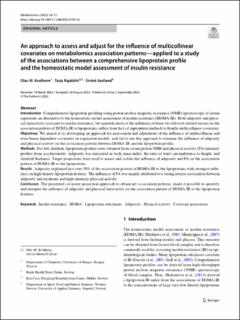| dc.contributor.author | Kvalheim, Olav Martin | |
| dc.contributor.author | Rajalahti, Tarja | |
| dc.contributor.author | Aadland, Eivind | |
| dc.date.accessioned | 2022-11-10T09:54:56Z | |
| dc.date.available | 2022-11-10T09:54:56Z | |
| dc.date.created | 2022-09-16T14:05:10Z | |
| dc.date.issued | 2022 | |
| dc.identifier.citation | Kvalheim, O. M., Rajalahti, T., & Aadland, E. (2022). An approach to assess and adjust for the influence of multicollinear covariates on metabolomics association patterns—applied to a study of the associations between a comprehensive lipoprotein profile and the homeostatic model assessment of insulin resistance. Metabolomics, 18(9):72. | en_US |
| dc.identifier.issn | 1573-3882 | |
| dc.identifier.uri | https://hdl.handle.net/11250/3031098 | |
| dc.description.abstract | Introduction
Comprehensive lipoprotein profiling using proton nuclear magnetic resonance (NMR) spectroscopy of serum represents an alternative to the homeostatic model assessment of insulin resistance (HOMA-IR). Both adiposity and physical (in)activity associate to insulin resistance, but quantification of the influence of these two lifestyle related factors on the association pattern of HOMA-IR to lipoproteins suffers from lack of appropriate methods to handle multicollinear covariates.
Objectives
We aimed at (i) developing an approach for assessment and adjustment of the influence of multicollinear and even linear dependent covariates on regression models, and (ii) to use this approach to examine the influence of adiposity and physical activity on the association pattern between HOMA-IR and the lipoprotein profile.
Methods
For 841 children, lipoprotein profiles were obtained from serum proton NMR and physical activity (PA) intensity profiles from accelerometry. Adiposity was measured as body mass index, the ratio of waist circumference to height, and skinfold thickness. Target projections were used to assess and isolate the influence of adiposity and PA on the association pattern of HOMA-IR to the lipoproteins.
Results
Adiposity explained just over 50% of the association pattern of HOMA-IR to the lipoproteins with strongest influence on high-density lipoprotein features. The influence of PA was mainly attributed to a strong inverse association between adiposity and moderate and high-intensity physical activity.
Conclusion
The presented covariate projection approach to obtain net association patterns, made it possible to quantify and interpret the influence of adiposity and physical (in)activity on the association pattern of HOMA-IR to the lipoprotein features. | en_US |
| dc.language.iso | eng | en_US |
| dc.publisher | Springer | en_US |
| dc.rights | Navngivelse 4.0 Internasjonal | * |
| dc.rights.uri | http://creativecommons.org/licenses/by/4.0/deed.no | * |
| dc.title | An approach to assess and adjust for the influence of multicollinear covariates on metabolomics association patterns - applied to a study of the associations between a comprehensive lipoprotein profile and the homeostatic model assessment of insulin resistance | en_US |
| dc.type | Peer reviewed | en_US |
| dc.type | Journal article | en_US |
| dc.description.version | publishedVersion | en_US |
| dc.rights.holder | © The Author(s) 2022 | en_US |
| dc.source.volume | 18 | en_US |
| dc.source.journal | Metabolomics | en_US |
| dc.source.issue | 9 | en_US |
| dc.identifier.doi | 10.1007/s11306-022-01931-6 | |
| dc.identifier.cristin | 2052535 | |
| dc.source.articlenumber | 72 | en_US |
| cristin.ispublished | true | |
| cristin.fulltext | original | |
| cristin.qualitycode | 1 | |

